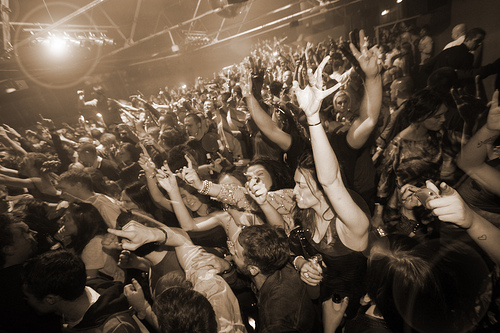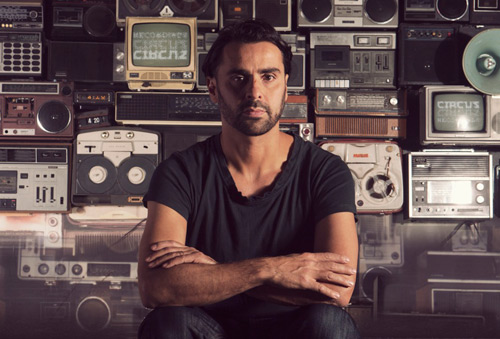In 2001 Liverpool was labelled ‘City Of Pop’ by the Guinness Book Of Records because of the vast number of international chart-topping records to have originated from the city. Liverpool has long been associated with musical creativity, as best typified by The Beatles and their legendary Sixties gigs (over 300 of them) at the similarly legendary Cavern Club.
But other local acts have followed, and greatly influenced, including fellow Merseybeat protagonists Gerry & The Pacemakers and, into the Seventies and Eighties, Echo & The Bunnymen, OMD and Frankie Goes To Hollywood. Beyond that one should note the success of guitar-led bands The Boo Radleys, Cast and The Farm (the Nineties) and The Zutons, The Wombats and The Coral (the Noughties). But what of the city’s electronic revolution in all this? Defected’s Ben Lovett seeks answers…
Fast-rising Liverpudlian house DJ-producer John Heckle partially joined the dots in an online interview two years ago. “I love Liverpool” he commented, “I don’t think I’d like to be anywhere else. Music-wise...there’s The Beatles, that’s what most of the city listened to. It’s hard not to be inspired by the fact that arguably the biggest band in the world is from your city.”
According to Yousef, speaking ahead of this year’s ADE extravaganza, Liverpool’s uniquely “friendly” make-up has further encouraged musical ideas to blossom, cross-pollinate and inspire new scenes and movements over the years. “The historical context [of Liverpool] is mainly the Beatles” he opens. “The city was full of social creatures, inspired by their music and the sounds and cultural trends arriving into the docks from America. Liverpool, today, remains very open; there’s a rich, friendly mixture of people. I hate to do clichés, but I’ve been fortunate enough to travel the world and I can honestly say Liverpool is the friendliest city of all. It is this that has helped drive our various music scenes on to such huge success.”
Unsurprisingly, Liverpool was quick to embrace America’s original house revolution. In 1988, local DJ James Barton launched the city’s first house night, Daisy, at the Stated Ballroom (a rammed weekday night that would, in turn, force a change of the club’s primetime weekend focus on rock) before starting up The Underground at Nights Alive, where, with John Kelly and Andy Carroll, he booked early dance acts Adamski and N-Joi. The police would eventually raid and close down the party but not before it had impacted Liverpool’s mainstream music scene – The Farm and Echo & The Bunnymen’s Ian McCulloch had, by now, become regulars.
In due course, Barton and Carroll founded promotional company Hax to secure local performances by Orbital and The Prodigy. The pair were also, to varying degrees, involved in massive all-night raves at Bootle venue Quadrant Park, before becoming resident DJs at the newly opened 051 Club - the year was 1991, and Barton and Carroll’s vibrant mix of Brit ‘n’ Yank house was building more and more momentum. When the duo, and mutual friend Darren Hughes, were then invited to a birthday party for K-Klass’s Paul Roberts (a Quad fan) in the backroom of Liverpool’s Academy Club, the idea for a new night Cream was born. Or so the legend goes....
The Academy’s backroom –relaunched as the Annexe at Nation – would host Liverpool’s defining dance music moment; and a major moment in the wider, international annals of club history. “I was part of the furniture from day one” Yousef reflects. “It was a hugely exciting time. Some people have criticised Cream’s subsequent commercial direction but what they forget is that Cream started as an antidote to the commercial, rave-y acid house parties that were dominating the area. There was nowhere for the music lover to go anymore; a cooler, well-dressed crowd. James and Andy brought over Knuckles [Frankie] and Morales [David]; they encouraged a cooler crowd, where socially, sexually and ethnically you could feel safe. Those first parties were on a completely different planet, allowing people to embrace the music again and forget their troubles.”

Fabled Cream resident Paul Bleasdale – who will be playing for the brand with Carroll at Red Bull Music Academy’s London Eye-based Revolutions In Sound event, November 14 – elaborates further: “Cream arrived because people had to go elsewhere for a quality night out, cities like Manchester and Leeds. I think, generally speaking, our city was jealous. We were crying out for something big. Liverpool, too, had no investment; it was in the middle of a tough economic depression. That actually made people want to go out even more; they were mad for it and we needed to match that intensity. We never expected it to get as big as it got; pretty soon people from all over the place wanted to come to Cream.”
Cream launched at Nation in October 1992 and stayed there, on a weekly basis, for 10 years before opting to focus on international festivals (under its Creamfields banner) and fewer, bigger events back in Liverpool. The brand made celebrity names of DJs Paul Oakenfold, Carl Cox, Sasha and Paul Van Dyk, and catalysed the phrase ‘superclub’ – a byword for clubland glam and excess, built on the Nineties trend for large, high-profile, high-capacity venues following dance music’s global explosion. Over time, Cream’s rise would earn it plaudits as well as criticism; the latter prompted by the brand’s ever-sharpening business acumen and supposed widening distance from its pure sonic roots.
“We fought hard to establish the right kind of vibe,” Bleasdale says. “We weren’t elitist but we screened to filter out any trouble. That went down well with people, so what were we supposed to do? We had to keep making better parties and, yes, that meant Cream did become more business-like. We were catering for more and more people so a degree of commercialism was inevitable. But has that had a negative effect? Not really. Cream, 21 years old now, still attracts a mixed, mad for it crowd to its events.”
Yousef, meanwhile, points to Cream’s positive impact on the local economy and more recent Liverpudlian club scene. “Cream has been really important for the city. It prompted the major regeneration of Slater Street [adjacent to Parr Street on which Nation resides]; now you have bars, restaurants, boutique shops and a more culturally diverse set of people in the area. In terms of my own experiences, I left Cream because of musical differences, but took its unique blueprint when developing my own night. Cream was the most successful brand ever and I wanted to follow that.”
He’s done a damn fine job. Yousef’s party Circus, originally at Masque (and today at the East Village Arts Club), has thrived since its 2002 debut, combining serious, underground house and fun, carefree atmosphere via everyone from Chris Liebing and Cassy to DJ Sneak and Catz ‘N Dogz. Circus has also taken to foreign climes remarkably well – Ibiza, New York, Miami - and spawned an enterprising record label. “This year, I really feel like I’ve concreted the concept of Circus” he suggests. “Clearly, it’s global now, but, from day one the mantra was ‘entertainment and enlightenment’ – I always wanted people to have a great time in Liverpool. Circus has a really mature relationship with the city these days; I think the city is supportive of its own, but we’re conscious that people are spending their hard-earned money with us and for that they have to be thanked and rewarded. I always go the extra mile when I’m DJing for my home crowds. They mean a lot.”

According to Bleasdale Liverpool has always offered dancefloor variety: “It was never just Cream; the alternatives to us were good, places like Voodoo [cult Nineties techno night]. We were always non-monopoly; we always thought that Cream would provoke others to do something completely counter.” But he concedes that the city’s club scene has really pushed on in recent times: “It’s just so amazing, so unrecognisably cosmopolitan. We always wanted this coolness in the city; deep down, Cream helped kick-start all this.”
Lewis Boardman is resident DJ at Circus as well as co-director of Chibuku Shake Shake, another pivotal Liverpool night, and programmer for DJ-savvy Slater Street bar The Shipping Forecast. What’s his take on the city in 2013? “We’re very self sufficient and honest if things aren’t good enough, which leads to constant improvement” he answers. “The people can be quite hard on things, so nothing is ever flash-in-the-pan; it’s all long-term thinking. We’ve built up Chibuku over many years, sticking to our guns. We booked Loco Dice when he was still Timo Maas’ manager and no-one knew him; we booked Seth Troxler for £200 three or four years ago and literally no-one turned up. We booked him again, and again, until he clicked for people. We like to take risks and encourage new thinking which I think is mirrored increasingly across the city.”
There is a noticeably heightened buzz in Liverpool these days. New electronic artists like Heckles, Evian Christ and Forest Swords are making exciting waves; and other (relatively) new nights are helping further engage and colourfully diversify the city’s nocturnal palate. Seasoned Ibiza veteran Trevor O’Loughlin, founder of edgy, off-the-radar ‘monthly’ mUmU (renowned for throwing quality underground house ‘n’ tech artists like Rhadoo and Mathias Kaden into various ‘secret’ urban spaces), feels the future is incredibly bright: “The Liverpool scene is very healthy. You have top underground nights like GetDown and Abandon Silence and, with mUmU, the crowds are hungry for more, and for new ideas like our Kitchen Street pop-up party. The unique challenge we now face is that where Liverpool has been heavily invested in and become this established cultural centre, we’re finding it harder to locate new disused spaces that fit the vibe of our parties. On a general level, the kids are embracing this mainstream dance resurgence and that is also affecting Liverpool’s underground vibe.”
Boardman nods: “I get eight or nine requests a day from kids looking to set up their own nights but they’re all really generic, copying the house sounds already out there. That’s a slight worry, but the exciting opportunities do still get through. Look at Andrew Hill [behind Abandon Silence] - he was this young kid bidding against me four years ago for a James Blake DJ set and I couldn’t believe someone of that age would know anything about someone like Blake. We agreed to meet and he started off doing events at The Shipping Forecast for me; now Four Tet’s personally requesting he play for him. Collectively, our city has a lot to give moving forwards.”
Words: Ben Lovett
Defected In The House heads to Circus Saturday 26th October - full details here



